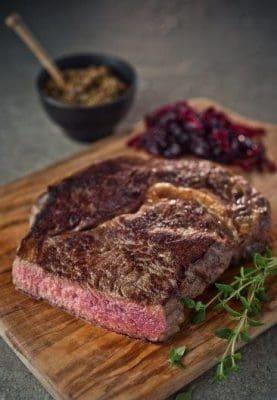An independent review of evidence on the contribution of red meat to adult diet and health has highlighted that large amounts of research "tend towards observational studies" which do not provide a fair or clear assessment of the benefits and risks of meat-based diets. .
The review, published earlier this month in the International Journal of Animal Biosciences, says red meat is a nutrient-rich food that has been a crucial part of the human diet for millennia and has contributed to the evolutionary development of the human brain.
However, in the current "often polarized debate", the nutritional value of red meat is often overlooked or forgotten.
Since the turn of the new millennium, red meat has become the main dietary target of climate activists who want to minimize humanity's impact on the environment by convincing millions of people to adopt a plant-based or vegan diet.
Nevertheless, scientific evidence has shown that red meat is a source of high-quality protein, micronutrients and essential fatty acids.
"While individuals may benefit from avoiding excessive meat consumption or choosing less processed meats, embracing a diet without animal foods is not without risk from a nutritional or health perspective."
The researchers also noted that the nutritional risks of meat-free diets are "rarely recognized" and need to be further investigated.
They also concluded that as long as nutrient intake remains adequate for health, it should be up to personal choice as to whether or not red meat is included in the diet.
Evidence supporting red meat in healthy diets
The authors say that available evidence shows that red meat is rich in nutrients and makes an important contribution to the diet of adults.
Raw red muscle meat typically contains 20-25 g of protein per 100 g.

The digestibility of the protein in meat is remarkably high, about 94 percent, significantly exceeding the digestibility of beans at 78% and whole wheat at 86%.
In addition, meat protein provides all nine essential amino acids.
Vitamin B12, of which red meat is a uniquely valuable nutritional source, played a vital metabolic role throughout human life, with particular importance during pregnancy and early development (the first 1000 days of life).
Current evidence links vitamin B12 deficiency to increased susceptibility to a range of neurological, vascular, immune and inflammatory diseases.
Studies also underlined the importance of red meat consumption for maintaining iron status, especially for premenopausal women, who have the highest daily iron requirements due to menstruation.
Research has also highlighted the essential role of red meat consumption in boosting the bioavailability of both iron and zinc, making it a valuable dietary choice for individuals looking to optimize micronutrient absorption and maintain overall health.
Nutrition and health claims
Strict guidelines apply to the use of nutrition and health claims in commercial communications about food products in Britain and Europe, the study said.
Within these strict parameters, the permitted nutritional claims that can be made specifically for beef, based on scientific evidence, are that it is rich in niacin, vitamins B6 and B12, zinc; a source of iron, potassium, phosphorus, riboflavin; while also being high in protein and naturally low in sodium.
Numerous permitted health claims that can be made for red meat include:
- Growth and maintenance of muscle mass,
- Maintenance of normal bones,
- Immunity support,
- energy-yielding metabolism,
- Reduction of tiredness and fatigue,
- Normal mental function,
- Maintenance of normal skin,
- Maintenance of normal hair and nails,
- Maintenance of normal vision
- Supports the normal formation of red blood cells, and
- Fertility and reproduction.
Despite the benefits, red meat consumption is declining in Britain
Despite the evidence supporting the role of red meat in healthy diets, the study finds red meat consumption in Britain is declining.
According to the UK National Diet and Nutrition Survey (NDNS), average red meat consumption has fallen since 2008 by 13 g/day, 23 g/day and 19 g/day for those aged 11-18, 19-64 years and ≥65 years. years respectively, with women eating significantly less red and processed meat than men.
Research also shows that adolescents and some adults in Britain have inadequate intakes of several nutrients found in red meat.
The authors noted that the potential risks associated with high red meat consumption in relation to chronic diseases have received considerable attention, but these were largely based on observational studies that were vulnerable to confounding by other dietary and lifestyle factors that influence disease risk.
"For example, high red meat intake is associated with low fruit, whole grain and nut intake, and high oil oil intake, which is expected to influence disease risk."
They also noted that while some recent systematic reviews and meta-analyses, based on observational data, had reported positive associations between higher consumption of red and processed meat and the incidence of cancer, cardiovascular disease and type 2 diabetes, similar analyzes had reported clinically insignificant associations with chronic diseases. risks or clear differences between the risks attributed to lean versus processed meat or between meat subtypes.
"In a systematic review and meta-regression, unprocessed red meat had a weak association with colorectal cancer, breast cancer, type 2 diabetes and ischemic heart disease, and no association with ischemic stroke or haemorrhagic stroke."
The review also noted that vegan diets can pose challenges for older adults in terms of muscle mass and strength maintenance.
Animal proteins tend to have superior protein quality and anabolic potential, especially for whole-body anabolic efficiency, compared to plant proteins.
Further research into meat-free diets is needed
The review concluded that a large-scale shift to plant-based diets may not benefit adults vulnerable to suboptimal nutrient intake, such as women of childbearing age and the elderly, and called for further research.
"Future research should reduce confusion and bias by comparing lean red meat within a balanced diet versus meat-free diets to determine benefits and risks."
The link to the review in the animal magazine can be found here